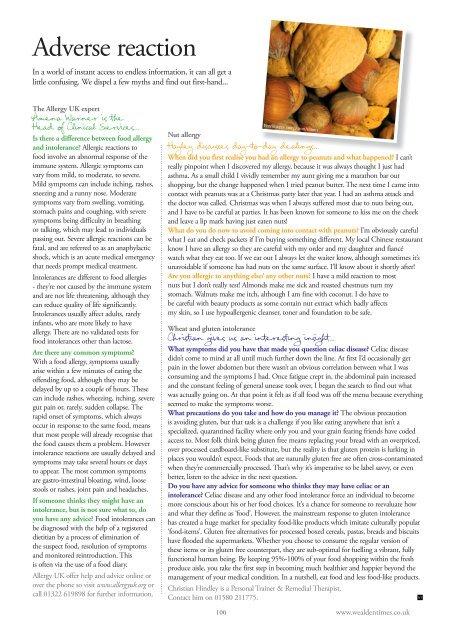Surrey Homes | SH21 | July 2016 | Interiors supplement inside
The lifestyle magazine for Surrey - Interiors Supplement, Fabulous Fashion, Delicious Dishes
The lifestyle magazine for Surrey - Interiors Supplement, Fabulous Fashion, Delicious Dishes
You also want an ePaper? Increase the reach of your titles
YUMPU automatically turns print PDFs into web optimized ePapers that Google loves.
Adverse reaction<br />
In a world of instant access to endless information, it can all get a<br />
little confusing. We dispel a few myths and find out first-hand...<br />
The Allergy uK expert<br />
Amena Warner is the<br />
Head of Clinical Services...<br />
Is there a difference between food allergy<br />
and intolerance? Allergic reactions to<br />
food involve an abnormal response of the<br />
immune system. Allergic symptoms can<br />
vary from mild, to moderate, to severe.<br />
Mild symptoms can include itching, rashes,<br />
sneezing and a runny nose. Moderate<br />
symptoms vary from swelling, vomiting,<br />
stomach pains and coughing, with severe<br />
symptoms being difficulty in breathing<br />
or talking, which may lead to individuals<br />
passing out. Severe allergic reactions can be<br />
fatal, and are referred to as an anaphylactic<br />
shock, which is an acute medical emergency<br />
that needs prompt medical treatment.<br />
Intolerances are different to food allergies<br />
- they’re not caused by the immune system<br />
and are not life threatening, although they<br />
can reduce quality of life significantly.<br />
Intolerances usually affect adults, rarely<br />
infants, who are more likely to have<br />
allergy. There are no validated tests for<br />
food intolerances other than lactose.<br />
Are there any common symptoms?<br />
With a food allergy, symptoms usually<br />
arise within a few minutes of eating the<br />
offending food, although they may be<br />
delayed by up to a couple of hours. These<br />
can include rashes, wheezing, itching, severe<br />
gut pain or, rarely, sudden collapse. The<br />
rapid onset of symptoms, which always<br />
occur in response to the same food, means<br />
that most people will already recognise that<br />
the food causes them a problem. However<br />
intolerance reactions are usually delayed and<br />
symptoms may take several hours or days<br />
to appear. The most common symptoms<br />
are gastro-intestinal bloating, wind, loose<br />
stools or rashes, joint pain and headaches.<br />
If someone thinks they might have an<br />
intolerance, but is not sure what to, do<br />
you have any advice? Food intolerances can<br />
be diagnosed with the help of a registered<br />
dietitian by a process of elimination of<br />
the suspect food, resolution of symptoms<br />
and monitored reintroduction. This<br />
is often via the use of a food diary.<br />
Allergy UK offer help and advice online or<br />
over the phone so visit www.allergyuk.org or<br />
call 01322 619898 for further information.<br />
Freeimages.com/JasonAntony<br />
Nut allergy<br />
Hayley discusses day-to-day dealings...<br />
When did you first realise you had an allergy to peanuts and what happened? I can’t<br />
really pinpoint when I discovered my allergy, because it was always thought I just had<br />
asthma. As a small child I vividly remember my aunt giving me a marathon bar out<br />
shopping, but the change happened when I tried peanut butter. The next time I came into<br />
contact with peanuts was at a Christmas party later that year. I had an asthma attack and<br />
the doctor was called. Christmas was when I always suffered most due to nuts being out,<br />
and I have to be careful at parties. It has been known for someone to kiss me on the cheek<br />
and leave a lip mark having just eaten nuts!<br />
What do you do now to avoid coming into contact with peanuts? I’m obviously careful<br />
what I eat and check packets if I’m buying something different. My local Chinese restaurant<br />
know I have an allergy so they are careful with my order and my daughter and fiancé<br />
watch what they eat too. If we eat out I always let the waiter know, although sometimes it’s<br />
unavoidable if someone has had nuts on the same surface. I’ll know about it shortly after!<br />
Are you allergic to anything else/ any other nuts? I have a mild reaction to most<br />
nuts but I don’t really test! Almonds make me sick and roasted chestnuts turn my<br />
stomach. Walnuts make me itch, although I am fine with coconut. I do have to<br />
be careful with beauty products as some contain nut extract which badly affects<br />
my skin, so I use hypoallergenic cleanser, toner and foundation to be safe.<br />
Wheat and gluten intolerance<br />
Christian gives us an interesting insight...<br />
What symptoms did you have that made you question celiac disease? Celiac disease<br />
didn’t come to mind at all until much further down the line. At first I’d occasionally get<br />
pain in the lower abdomen but there wasn’t an obvious correlation between what I was<br />
consuming and the symptoms I had. Once fatigue crept in, the abdominal pain increased<br />
and the constant feeling of general unease took over, I began the search to find out what<br />
was actually going on. At that point it felt as if all food was off the menu because everything<br />
seemed to make the symptoms worse.<br />
What precautions do you take and how do you manage it? The obvious precaution<br />
is avoiding gluten, but that task is a challenge if you like eating anywhere that isn’t a<br />
specialized, quarantined facility where only you and your grain fearing friends have coded<br />
access to. Most folk think being gluten free means replacing your bread with an overpriced,<br />
over processed cardboard-like substitute, but the reality is that gluten protein is lurking in<br />
places you wouldn’t expect. Foods that are naturally gluten free are often cross-contaminated<br />
when they’re commercially processed. That’s why it’s imperative to be label savvy, or even<br />
better, listen to the advice in the next question.<br />
Do you have any advice for someone who thinks they may have celiac or an<br />
intolerance? Celiac disease and any other food intolerance force an individual to become<br />
more conscious about his or her food choices. It’s a chance for someone to reevaluate how<br />
and what they define as ‘food’. However, the mainstream response to gluten intolerance<br />
has created a huge market for speciality food-like products which imitate culturally popular<br />
‘food-items’. Gluten free alternatives for processed boxed cereals, pastas, breads and biscuits<br />
have flooded the supermarkets. Whether you choose to consume the regular version of<br />
these items or its gluten free counterpart, they are sub-optimal for fuelling a vibrant, fully<br />
functional human being. By keeping 95%-100% of your food shopping within the fresh<br />
produce aisle, you take the first step in becoming much healthier and happier beyond the<br />
management of your medical condition. In a nutshell, eat food and less food-like products.<br />
Christian Hindley is a Personal Trainer & Remedial Therapist.<br />
Contact him on 01580 211775.<br />
100 www.wealdentimes.co.uk


















